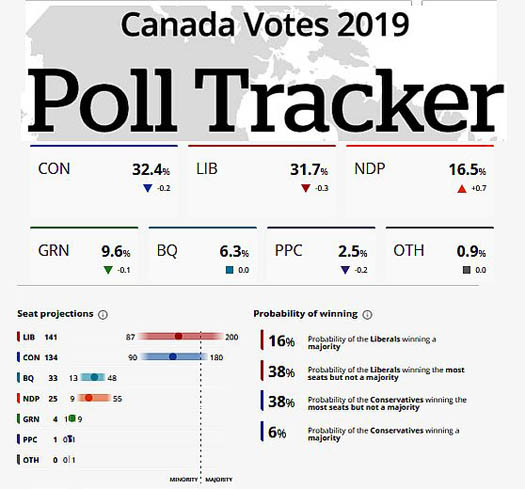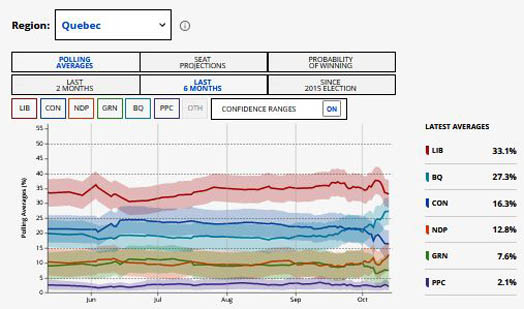
The term “shit election” was coined by Liberal Party apparatchiks Scott Reid and David Herle, and Conservative Party eminence gris Jenny Byrne (no mean feat being an eminence gris at only 42 years of age), although, for the sake of propriety, the title of that particular episode of The Herle Burly podcast — where for the past month and more all three have weighed in on the current federal election — eventually was titled The Seinfeld Election, “where the various political parties offering candidates in the 43rd Canadian federal general election are throwing the kitchen sink at the public and at each other, effectively turning the race into an episode of Seinfeld: an election about nothing.” And so this election has proven to be.
If you look at CBC’s poll tracker above, the intentions of the electorate have barely shifted since the writ was dropped on Wednesday, September 11th. The two leading parties have been stuck at 33% for the past five weeks, while the NDP have inched up a couple of points, as have the fortunes of the Bloc Québécois. Elizabeth May’s Green Party has failed to move the needle at all, as is the case with Maxime Bernier’s People’s Party of Canada.
Chances are that for the first time in a decade, Canadians face the prospect of a hung Parliament, with no Canadian federal party emerging with enough seats to form anything other than a precarious minority government. If, as the poll above suggests, the Liberals garner 140 seats, the NDP 25 and the Greens 4, together the three parties would not have enough votes to pass a budget or any legislation in the Parliament of Canada. If the Bloc outdoes expectations and garners 40 seats, Bloc leader Yves-François Blanchet could effectively align himself with Andrew Scheer and the Conservatives, for a non-coalition / “working agreement” majority — a very real prospect.
Up until a week ago, it looked as if Justin Trudeau would be able to form a government of around 154 seats (170 seats constitutes a majority) with the support of Jagmeet Singh’s NDP and Elizabeth May’s Green Party — and all would be right with the world. Canada would continue to have progressive government, both domestically and on the world stage.
One week ago, the Liberals were leading in all provinces across Canada, except on the Prairies (the base of support for the Conservatives), with 40% of the vote wrapped up in the three largest, and most seat rich, provinces: British Columbia, Ontario and Québec, and the prospect of 154 to 164 seats in Parliament. But, alas, no more. Bloc leader Yves-François Blanchet — with his message of “Québec for Québecers, we’re not interested in federal politics, we’re interested only in representing the interests of Québec” — has decimated prospects in Québec for both the Liberals and, more particularly for, the Conservatives.

In Québec, Liberal support has dropped 6 points to 33.1%, the Conservatives dropping from 23% to 16%, the NDP on the rise at 12.8% (up 3 points), and the Greens a non-factor (again, as is the case with the People’s Party of Canada). Only a week ago, the Liberals were looking to win between 50 and 60 seats in Québec (out of 78 seats). But no more. The Liberals will hold on to only 30 – 33 of their current 40 seats, the Conservatives will be decimated, winning maybe 2 seats (down from 11 in the last Parliament), the NDP could hold on to a half dozen Québec seats, while the Bloc Québécois will pick up the rest, with 40 seats or more.
In 2019, no federal party policy platform, no issue, and no federal party leader has fired the imagination across a cross-section of the electorate.
In 2015, cannabis legalization brought out hundreds of thousands of new voters, Canadians who would otherwise have stayed home, a commitment by the Liberals to raise minimum pension payments for seniors to $2000 a month by 2024 (more on that tomorrow), a return to sanity in Ottawa — with Justin Trudeau committed to holding regular press conferences, as well as regular town halls across the country, in contrast to a secretive and elitist Stephen Harper government, which hadn’t had a press conference since 2006 — a commitment to a child tax credit for families that would make life easier and more affordable for young families, a commitment to proportional representation, to building transit infrastructure and affordable housing across Canada, allowing scientists to speak freely and openly on issues respecting the environment, and the introduction of assisted dying legislation saw a record number of Canadians going to the polls.
In 2019: nada, nothing, zilch — aside from a commitment from Andrew Scheer to gut infrastructure spending, gut foreign aid, and a commitment to do nothing on the climate change file. And the electorate yawns.
As we write above: a “shit election” — when there is so much on the line.